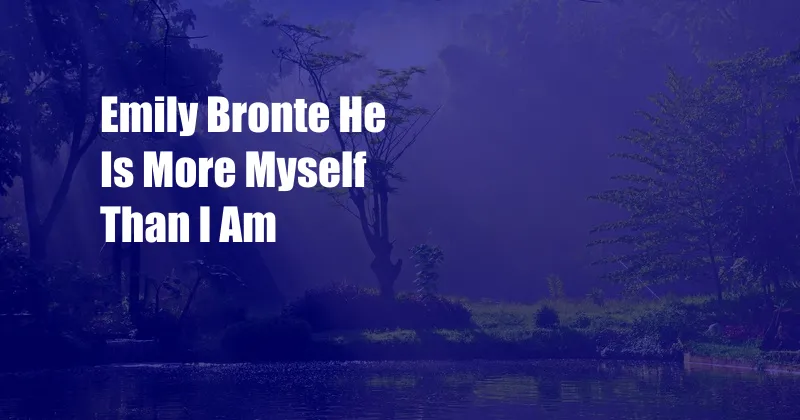
Emily Brontë: “He is more myself than I am”
In the windswept moors of Haworth, England, resided one of literature’s most enigmatic figures: Emily Brontë. Her unforgettable words, “He is more myself than I am,” uttered by Catherine Earnshaw about Heathcliff in her masterpiece “Wuthering Heights,” reveal the profound bond between two kindred spirits.
Brontë’s own life was marked by tragedy and solitude, yet her imagination soared to extraordinary heights. Her writing delved into the complexities of human nature, exploring the depths of passion, obsession, and the enduring power of love.
The Haunting Allure of “Wuthering Heights”
At its core, “Wuthering Heights” is a tale of forbidden love between Catherine Earnshaw and Heathcliff, an orphaned boy adopted by her father. Catherine’s fickle nature and Heathcliff’s status as an outsider create a tumultuous relationship marked by intense emotions and a desire that transcends death.
The novel’s Gothic elements, with its brooding atmosphere and supernatural overtones, add an eerie yet mesmerizing quality to the story. The characters are haunted by their past and consumed by their own passions, leading to a tragic and unforgettable end.
Emily Brontë’s Life and Literary Legacy
Emily Brontë was born on July 30, 1818, into a family of writers. Her education was unconventional, largely consisting of self-study and the influence of her siblings. Tragedy struck early when her mother and sisters died from consumption, leaving a lasting emotional scar on Emily.
Emily’s literary career blossomed in the mid-1840s, with the publication of poems and a novella under the pseudonym Ellis Bell. However, it was “Wuthering Heights,” published in 1847, that cemented her place in literary history. The novel’s unique and powerful voice, with its raw emotions and unflinching exploration of human nature, initially met with critical resistance but has since become a classic of English literature.
Understanding the Meaning of “He is more myself than I am”
Catherine Earnshaw’s famous declaration reveals the complex nature of her relationship with Heathcliff. In a world where societal norms and expectations bind individuals, Catherine feels a profound kinship with Heathcliff that transcends social barriers.
Their connection is so deep that Catherine’s very identity becomes entwined with Heathcliff’s. She recognizes that they are kindred spirits, sharing similar passions, desires, and a profound understanding of each other’s souls. Even in death, their bond remains unbreakable, symbolizing the enduring power of true love.
Modern Interpretations and Cultural Impact
Over the centuries, “Wuthering Heights” has inspired countless adaptations, from stage plays to films and television series. Its themes of love, obsession, and the human condition continue to resonate with audiences worldwide.
Modern interpretations often explore the feminist and class dimensions of the novel, highlighting Catherine’s struggle to find freedom and agency in a patriarchal society. The novel’s unconventional portrayal of love and morality has also sparked debates about its impact on social norms and expectations.
Tips and Expert Advice for Understanding “Wuthering Heights”
Approaching “Wuthering Heights” can be a daunting task for first-time readers. However, with careful preparation and an open mind, you can unlock the novel’s treasures.
First, familiarize yourself with the Gothic genre to better appreciate the novel’s eerie and suspenseful atmosphere. Second, pay close attention to the characters’ motivations and relationships, as they form the core of the story.
FAQs about “Wuthering Heights”
Q: Why is “Wuthering Heights” considered a masterpiece?
A: The novel’s unique voice, complex characters, and enduring themes have established it as a classic of English literature.
Q: What are some of the novel’s key themes?
A: Love, obsession, revenge, the conflict between nature and civilization, and the power of memory.
Q: Who is the narrator of “Wuthering Heights”?
A: The story is narrated by Mr. Lockwood and Nelly Dean, a housekeeper at Wuthering Heights.
Conclusion
Emily Brontë’s timeless words, “He is more myself than I am,” invite us to reflect on the profound connections we form with others. Whether it’s the fiery passion and unwavering loyalty of Catherine Earnshaw or the transformative power of self-discovery, “Wuthering Heights” remains a testament to the enduring human spirit.
Are you interested in exploring the enigmatic world of Emily Brontë’s “Wuthering Heights”? Delve into the novel’s secrets, discover its enduring legacy, and let its characters haunt your imagination.